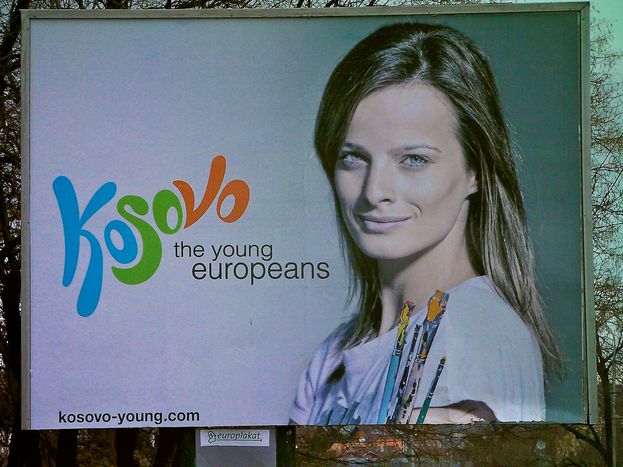
Interview - What kind of recognition for Kosovo?
Published on
Rather than independence, I was more interested in the issue of recognition. What are the principles that support the recognition of Kosovo? Which sovereignty for the inhabitants of Kosovo? For a better understanding, I met with Barbara Delcourt, author of “Droit et souverainetés. Analyse critique du discours européen sur la Yougoslavie” (Law and sovereignties.
A critical analysis of the European speech on Yugoslavia) PIE/Peter Land editions.
Snejana Jovanovic: What is behind the principle of “conditional recognition”?
Barbara Delcourt: Conditional recognition was a mechanism the European countries invented when the Federation of Yugoslavia was dismantled in the beginning of the ’90s and consisted in the obligation for political entities who wanted to be recognized to respect a certain amount of principles in international law, that is in a word to be a respectful democracy of a rule of law state, Human Rights and fundamental liberties; in addition they had to respect what we called the right of minorities. The idea was that considering the projects’ legitimity, the fact of respecting a certain number of rules all acknowledged could ensure a form of stability in the Balkans.S.J.: is this kind of recognition relevant for the Kosovo case?
The case of Kosovo is a little different. This mechanism has not really been used to justify Kosovos’s recognition. When the Republics of Yugoslavia had been recognized, two principles had been adduced by the Europeans to justify their decision. There was, first, the principle of effectivity and the principle of legitimacy. The principle of effectivity states that a country can be recognized only if certain conditions are satisfied, which have nothing to do with the usual principles of conditional recognition. These conditions hold to the fact that we must be in presence of political entities with certain characteristics. This political entity has to be capable of independence and autonomy towards the outside. There must be a sovereign government, a more or less delimited territory and a government capable of exercising its authority on all its territories and inhabitants. These criteria have been mainly used to define what a state is in international law and serve as conditions to its recognition. It is therefore essentially based on the existence of an actual power. In certain cases within the Yugoslavia situation in the beginning of the ’90s, this effectivity was not always obvious, especially, I think, in the case of Bosnia-Herzegovina. In this case we tend to refer to the principle of legitimacy and in particularly to the right to self-determination. The idea was: we recognize the independence of the republics asking for it because the population living on these territories has a right to self-determination. At that time, the European policy was justified along these two lines.We do not really use these two lines anymore, since, today, in the Kosovo case we can refer neither to the principle of effectivity, nor the principle of legitimacy. Kosovo is now under international administration of its territory and does not have an autonomous and independent government able to maintain power over all the territory. And the right to self-determination has not been invoked since we precisely do not want other minorities living in other states to use the right to self-determination and justify separatism.SJ: How about today?
SJ: how can the recognition of Kosovo be qualified with?
This recognition applies more to a declaration of intention of independence rather than to the recognition of a State because what the Ahtissari plan implements and what is in mind of every Europeans delegates is not to recognize a sovereign State at all but a political entity limited in its powers by the intervention of exterior actors: first the UNO through the United Nations Interim Administration Mission in Kosovo (UNMIK), then the EU management after the declaration of independence. In the end, this is the separation from Serbia which is being recognized rather than an independent State and we actually speak of recognition of a limited and controlled sovereignty. It is not in deed about recognizing a sovereign State. It is what we call ‘earned sovereignty’ that is a sovereignty that is deserved and depends on the attitude of the Kosovo authorities.Actually what is interesting is that in the ’90s, the European Community and its member States (the EU did not exist yet) tried to justify its political position with international law that they interpreted, often in a funny way, but still in reference to it. It is absolutely different today. This sounds a little paradoxical because at the same time the EU is on the verge of acquiring a status of international actor different from other actors like traditional powers because of heavy references to the Charter of the United Nations and international law and total support of the principles of multilateralism; but, in the Kosovo case, a operation will be launched without the Security Council’s green light. So we cannot speak about multilateralism. References to international law are no longer made because it would serve neither the partition of Serbia nor the fact that we do not respect the right the inhabitants of Kosovo have to be sovereign since some sort of international protectorate will be created. The justifications used are Ethics and Moral based or relies on politics and geostrategy. *Barbara Delcourt is professor at the Institute of European Studies of ULB.Snejana Jovanovic


